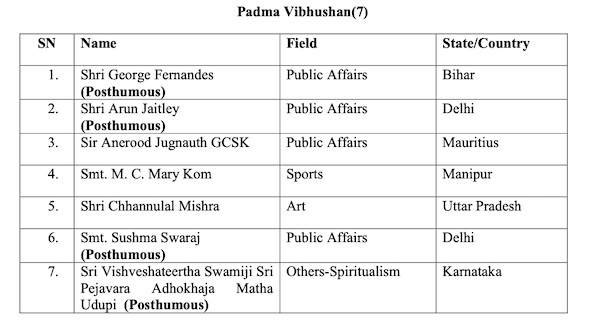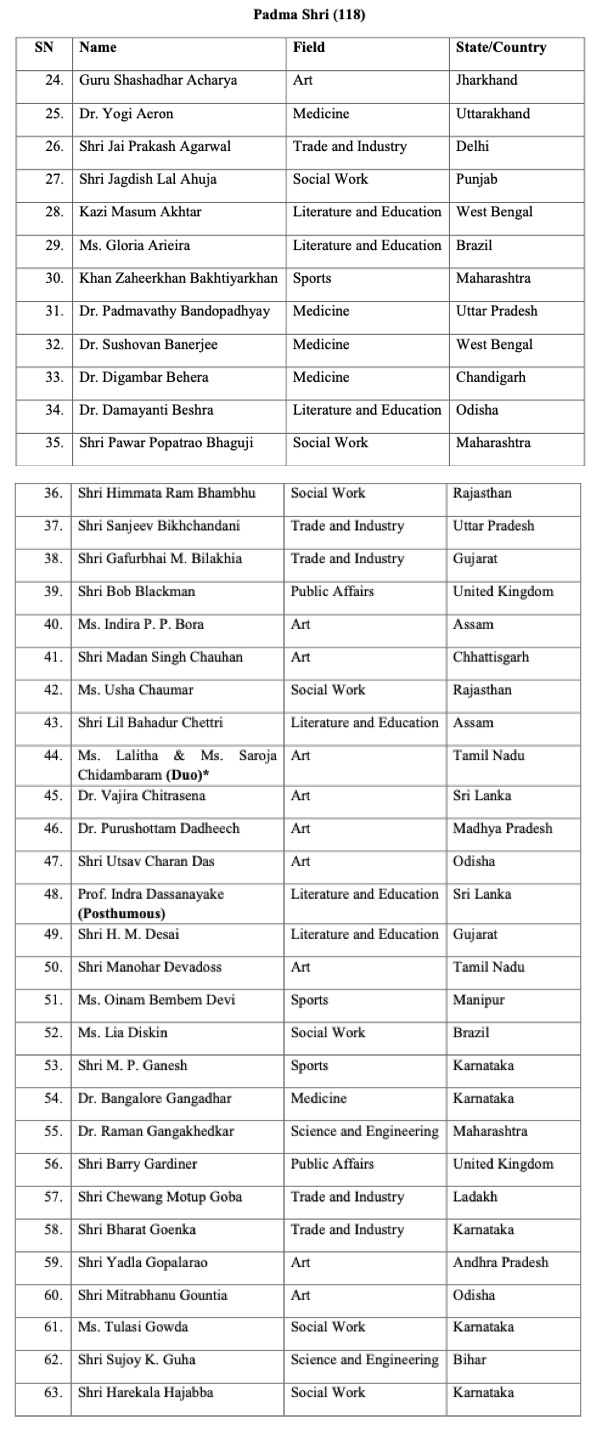Padma awards: 2020
This is a collection of articles archived for the excellence of their content. |
2020
Lt Gen DS Hooda, January 26, 2020: The Times of India
On April 28, the snow clearance equipment of the Border Roads Organisation breached the snow covering the Zojila Pass and opened the Srinagar-Leh highway. Leading this effort was Anayatullah, a hearing and speech impaired bulldozer driver, who is said to work with instinct over a road alignment that is not visible due to the snow.
Anayatullah is one of the heroes who operate and live in these extraordinarily treacherous and demanding conditions to keep our borders safe. To most of our citizens, the valour of the military is known through tales of those who win gallantry awards, carry out ‘surgical strikes’ or sacrifice their lives in fighting terrorism. The contribution of these braves is enormous, but we must also recognize that the common soldier, who goes about his task with fortitude and courage, is the real unsung hero of our military. Let me tell his story in the backdrop of the opening of Zojila Pass.
As you drive across the Zojila towards Leh, on your left are the heights of Kargil-Dras Sector, over which we fought the bloody Kargil war of 1999. At the many posts that are located at heights going up to 17,000 feet, thousands of soldiers would now be preparing to come down to their bases and then onwards on a spot of leave to meet their families.
These are soldiers who had hitched on their backpacks and climbed up to their posts six months ago in November. Isolated and cut off from civilisation through the winters, watching 40 feet of snow come down and cover all routes to their post, enduring minus 50-degree temperatures, eating food out of tins, they have lived through efforts that can only be described as superhuman.
Without any access to modern facilities like the internet and mobile phones, they could only rely on the company of the dozen comrades on their post. And the faith that these comrades would wade through the snow, carrying on their shoulders any one of them who fell sick.
Even as some soldiers are readying to leave Ladakh in May, thousands are preparing to go in. As soon as the Zojila opens, supplies have to be stocked for the next winter when this region will be cut off for six months.
Everything that a soldier needs, from a needle to a toothbrush to guns, has to be sent in. The round trip of vehicles driving from supply depots around Pathankot and Jammu to Leh takes 10 to 14 days. A driver sleeps in a different transit camp each night on this journey. On his return after delivering his stores, he is given a two-night rest before he starts again.
And he does this routine for six months, driving a total of 20,000 km on the most dangerous mountain roads in the world.
Getting stores to Leh is only half the story. Food, clothing, the fuel for heating, and soap for the occasional bath have to reach the soldiers at their high altitude posts. This is the bigger challenge as there are numerous posts, and almost all in Siachen, that have no roads connecting them. Some have routes that can be traversed by ponies and many where only a man can walk.
Three and a half thousand military mules work daily in Northern Command to stock up forward posts. They are accompanied by soldiers who are called animal transport (AT) drivers. I have personally met an AT driver who had walked 1,700 km in one summer season with his mules in punishing terrain where even breathing is a difficulty.
The army cannot do this enormous exercise by itself. The locals of Jammu and Kashmir, particularly those in Ladakh, make an immeasurable contribution. Each year, the army hires 38 lakh porters and 11 lakh ponies to take supplies to the posts along the Line of Control. In many ways, these porters are the army’s lifeline, some of them staying alongside our soldiers on the most difficult posts.
They provide local knowledge of weather conditions, information on avalanche safe routes, and help in evacuating casualties.
The Indian Air Force is invaluable, carrying out, year after year, what is probably the biggest airlift in the world. Their transport fleet flies in everything from tanks to tomatoes and helps sustain the army through the challenging winter months. But the real champions are the helicopter pilots, both air force and army.
Flying in single-engine aircraft that are pushing the limits of their technical capability, they put their own lives at risk to rescue a sick soldier. I have seen this time and again.
In this time of a vitiated debate about which political party is best for the Indian military, it is hoped that the contribution of the common soldier will not be forgotten. He is the one who is keeping India safe, quietly and confidently.
The entire list

From: www.padmaawards.gov.in

From: www.padmaawards.gov.in

From: www.padmaawards.gov.in

From: www.padmaawards.gov.in

From: www.padmaawards.gov.in

From: www.padmaawards.gov.in
1. Padma Awards - one of the highest civilian Awards of the country, are conferred in three categories, namely, Padma Vibhushan, Padma Bhushan and Padma Shri. The Awards are given in various disciplines/ fields of activities, viz.- art, social work, public affairs, science and engineering, trade and industry, medicine, literature and education, sports, civil service, etc. ‘Padma Vibhushan’ is awarded for exceptional and distinguished service; ‘Padma Bhushan’ for distinguished service of high order and ‘Padma Shri’ for distinguished service in any field. The awards are announced on the occasion of Republic Day every year.
2. These awards are conferred by the President of India at ceremonial functions which are held at Rashtrapati Bhawan usually around March/ April every year. This year the President has approved conferment of 141 Padma Awards including 4 duo cases (in a duo case, the Award is counted as one) as per list below. The list comprises 7 Padma Vibhushan, 16 Padma Bhushan and 118 Padma Shri Awards. 33 of the awardees are women and the list also includes 18 persons from the category of Foreigners/NRI/PIO/OCI and 12 Posthumous awardees.